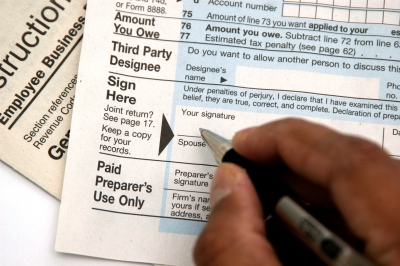Divorce
The Trouble for the Innocent Spouse with the IRS and State Tax Authorities
Spouses that unwittingly sign a state or federal tax return may be held joint and severably liable for underpaid taxes. The expanded innocent spouse relief provides potential relief, but that relief takes time and requires extensive documentation.
 As a financial forensic CPA, I travel down the road of hidden assets, hidden income, deception, and observe bad behavior to intentionally punish a former spouse. These kinds of engagements present unique problems when the value of a business is part of the case. There are also other troubling aspects that involve collection and the ensuing stress. I have seen fear in the eyes of the innocent spouse who is being financially consumed by the Internal Revenue Service’s collection division and their efforts to punish the innocent spouse who simply signed her name on a tax return. While women are usually the “innocent spouse,” there are increasingly times when the husband—perhaps the stay-at-home dad—is the innocent spouse.
As a financial forensic CPA, I travel down the road of hidden assets, hidden income, deception, and observe bad behavior to intentionally punish a former spouse. These kinds of engagements present unique problems when the value of a business is part of the case. There are also other troubling aspects that involve collection and the ensuing stress. I have seen fear in the eyes of the innocent spouse who is being financially consumed by the Internal Revenue Service’s collection division and their efforts to punish the innocent spouse who simply signed her name on a tax return. While women are usually the “innocent spouse,” there are increasingly times when the husband—perhaps the stay-at-home dad—is the innocent spouse.
In preparation for a separation or divorce, some spouses seeking a better settlement will decrease their business profits by diverting income or by claiming improper business expenses.
The trouble for the innocent spouse—who has agreed to file a joint income tax return before or during the separation—arises months or years after; that is, when the IRS or the state of Illinois (the state in which I practice) discovers unreported income on the joint tax return. The taxing agencies will hold both the innocent and guilty spouse jointly and severably liable for the underreported income taxes, tax penalties, and accrued interest.
Joint and severably liable means that the IRS will grab the money from either spouse, without concern as to fairness. The guilty party who is hiding assets and money will generally allow the innocent spouse to be burdened by paying 100 percent of the tax debt.
For instance, last year a woman was referred to me. Her husband of three years was cheating on his income taxes. The husband’s business was audited by the IRS. The young woman was told by an IRS collections officer that since she filed a joint tax return, she owed $220,000. The IRS garnished her wages, placed a lien on her pre-marital real estate, and levied her bank accounts. Her husband told her it was a mistake and “not to worry.”
How Can You Be Protected?
Both the IRS and the state of Illinois recognize that there are innocent spouses who:
- Filed a joint income tax return not knowing the guilty spouse failed to report on the income tax returns, gross income, deducted improper deductions, or took improper tax credits.
- The innocent spouse, like a reasonable person in a similar circumstance, would have not known of the underreporting. The government will consider the innocent spouse’s education, business experience, the nature of the underreporting and the individual’s financial condition.
The government recognizes that innocent spouses must be protected. Accordingly, the government has established procedures where an innocent spouse can be freed from financial pitfalls orchestrated by the guilty spouse’s tax trap.
In evaluating an innocent spouse claim, the government will consider the benefit the innocent spouse received and whether the spouses are separated or divorced. As the forensic CPA who examines the spouse’s business for possible hidden income or assets, I will recommend at times to the innocent spouse that filing a separate tax return rather than a joint tax return may be financially safer.
An agreement drafted by the attorneys—where the guilty spouse agrees to pay all tax liabilities should the IRS determine that there is income tax liability—is not binding on the IRS and affords the innocent spouse little protection. More often than not, the attorneys handling the family law case are not current on tax law and procedure and should engage either a tax attorney to advise them and the court on the fine points and newer revenue rulings or a CPA that is current in this area of law.
My experience with the IRS is that if the innocent spouse presents a well-documented case, the government will consider the granting of innocent spouse protection. But this relief takes time and effort to secure. In my client’s case, it took several months before the IRS conceded and eventually the woman recovered the money and property that had been levied. Had she listened to her now ex-husband, she would have been penniless, chasing after her ex-husband with no financial resources to pay an attorney.
The lesson is: If you are in a shaky marriage and you are either aware of fraud or believe that your spouse or soon-to-be ex-spouse is improperly reporting the business’ taxable income, do not sign a joint tax return.
Larry Goldsmith, JD, CPA, MAFF, is the partner leading CJBS, LLC’s Litigation & Forensic Accounting Services practice. Mr. Goldsmith can be contacted at (847) 580-5427 or e-mail Larry@cjbs.com.









